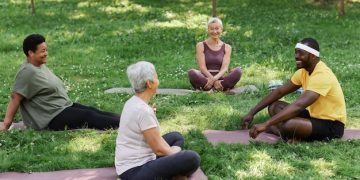The 5 Best Stress-Relieving Techniques You Can Implement Today

Struggling with stress? Discover five evidence-based techniques—mindfulness meditation, regular exercise, social connection, spending time in nature, and practicing gratitude—that you can implement today to effectively manage stress and enhance your overall well-being.
Feeling overwhelmed by stress? You’re not alone. In today’s fast-paced world, stress is a common experience. The good news is that there are simple, effective strategies you can use to regain control and find peace of mind. Let’s explore the 5 best stress-relieving techniques you can implement today to start feeling calmer, happier, and more in control.
Understand Your Stress Triggers
Before diving into stress-relieving techniques, it’s important to understand what triggers your stress. Identifying your stressors can help you proactively manage them.
Common Stress Triggers
Stress triggers vary from person to person. Common stressors include work deadlines, financial worries, relationship issues, and health concerns.
Take some time to reflect on your life and identify the situations, people, or thoughts that tend to increase your stress levels. Once you’re aware of these triggers, you can start to develop strategies for coping with them.
Keeping a Stress Journal
One effective tool for identifying your stress triggers is keeping a stress journal. Each day, jot down situations that caused you stress, your reactions (both physical and emotional), and how you coped with the stress.
- Record the Date and Time: Note when the stressful event occurred.
- Describe the Trigger: Detail the specific situation that led to stress.
- Document Your Reactions: Write down your physical, emotional, and behavioral responses.
- Evaluate Your Coping Mechanisms: Assess how you handled the stress and whether it was effective.
Over time, patterns will emerge, allowing you to pinpoint your primary stress triggers and develop more effective coping strategies. Understanding your stress triggers is the first step towards managing stress effectively and improving your overall well-being.

Mindfulness Meditation
Mindfulness meditation is a powerful technique that involves focusing on the present moment without judgment. It can significantly reduce stress by cultivating awareness and acceptance.
How to Practice Mindfulness Meditation
To practice mindfulness meditation, find a quiet place where you can sit comfortably. Close your eyes or keep them softly focused on a point in front of you. Bring your attention to your breath, noticing the sensation of each inhale and exhale.
When your mind wanders (and it will!), gently guide your attention back to your breath. There’s no need to judge yourself for having wandering thoughts; simply acknowledge them and let them pass. Start with 5-10 minutes of meditation per day and gradually increase the duration as you become more comfortable.
Benefits of Mindfulness Meditation
- Reduces Anxiety: Regular meditation can decrease feelings of anxiety and worry.
- Improves Focus: Mindfulness enhances your ability to concentrate and stay present.
- Lowers Blood Pressure: Meditation has been shown to lower blood pressure and promote cardiovascular health.
- Enhances Emotional Regulation: Mindfulness helps you become more aware of your emotions and manage them more effectively.
Mindfulness meditation is a valuable tool for managing stress and promoting overall well-being. By incorporating this practice into your daily routine, you can cultivate a greater sense of calm and resilience, even in the face of challenging situations.
Regular Exercise
Physical activity is a fantastic stress reliever. Exercise releases endorphins, which have mood-boosting and pain-relieving effects. It also helps you burn off excess energy and tension.
Types of Exercise for Stress Relief
Any form of exercise can help reduce stress, but some activities are particularly effective. Aerobic exercises like running, swimming, and cycling can boost your mood and reduce anxiety. Yoga and tai chi combine physical movement with mindful breathing, promoting relaxation and reducing stress hormones.
Tips for Incorporating Exercise into Your Routine
Make exercise a regular part of your life by finding activities you enjoy and setting realistic goals. Start with small, manageable steps, such as a 15-minute walk during your lunch break or a 30-minute yoga class twice a week.
- Find an Activity You Enjoy: The more you enjoy an exercise, the more likely you are to stick with it.
- Set Realistic Goals: Start small and gradually increase the intensity and duration of your workouts.
- Schedule Exercise Like an Appointment: Treat your workouts as important commitments.
- Involve a Friend: Exercising with a friend can make it more enjoyable and help you stay motivated.
Regular exercise is a powerful tool for managing stress and improving your overall health. By finding activities you love and making them a part of your routine, you can effectively reduce stress and enjoy a happier, healthier life.
Social Connection
Humans are social beings, and strong social connections are essential for well-being. Spending time with supportive friends and family can provide a sense of belonging and reduce feelings of loneliness and stress.
The Importance of Social Support
Social support acts as a buffer against stress. When you’re feeling overwhelmed, talking to a trusted friend or family member can provide comfort and perspective. Social connections also offer opportunities for fun and relaxation, which can help you unwind and recharge.
Building and Maintaining Social Connections
Building and maintaining strong social connections requires effort. Make it a priority to spend time with the people who matter to you. Join social groups or clubs that align with your interests. Reach out to friends and family regularly, even if it’s just for a quick chat.
Volunteering can also be a great way to meet new people and build connections while giving back to your community. Nurturing your social connections is an investment in your well-being and can significantly reduce stress and improve your quality of life.
Spending Time in Nature
Nature has a calming and restorative effect on the mind and body. Spending time outdoors can lower stress hormones, improve mood, and boost overall well-being.
Benefits of Nature Exposure
Studies have shown that spending time in nature can reduce blood pressure, heart rate, and levels of the stress hormone cortisol. Nature also provides opportunities for physical activity, such as hiking, walking, or gardening, which can further enhance stress relief.
Even a short walk in a park or a few minutes spent admiring trees can make a difference. Nature offers a sense of peace and tranquility that can help you disconnect from the stresses of daily life and reconnect with yourself.

Incorporating Nature into Your Daily Life
Make nature a regular part of your life by finding ways to spend time outdoors. Take a walk in a park or forest, visit a botanical garden, or simply sit outside and enjoy the fresh air. If you live in an urban area, seek out green spaces like community gardens or rooftop gardens.
- Take a Walk in a Park: Even a short walk can provide a calming effect.
- Visit a Botanical Garden: Immerse yourself in the beauty of plants and flowers.
- Go Hiking: Explore nature trails and enjoy the physical activity.
- Practice Gardening: Nurture plants and connect with the earth.
Spending time in nature is a simple yet powerful way to reduce stress and improve your overall well-being. By incorporating nature into your daily routine, you can create a more peaceful and balanced life.
Practicing Gratitude
Gratitude is the act of focusing on and appreciating the good things in your life. It can shift your perspective, reduce negative emotions, and increase feelings of happiness and contentment.
How to Cultivate Gratitude
There are many ways to cultivate gratitude. Keeping a gratitude journal is a popular method. Each day, write down a few things you’re thankful for. They can be big things, like a loving family, or small things, like a delicious cup of coffee.
Expressing gratitude to others is another powerful way to boost your mood and strengthen your relationships. Tell a friend or family member how much you appreciate them. Write a thank-you note to someone who has made a positive impact on your life.
Benefits of Gratitude
- Reduces Stress: Focusing on gratitude helps shift your attention away from negative thoughts and worries.
- Increases Happiness: Appreciating the good things in your life boosts feelings of joy and contentment.
- Improves Relationships: Expressing gratitude strengthens your connections with others.
- Enhances Resilience: Gratitude helps you cope with challenges and setbacks.
Practicing gratitude is a simple yet profound way to reduce stress and improve your overall well-being. By focusing on the positive aspects of your life, you can cultivate a greater sense of happiness, resilience, and connection.
| Key Technique | Brief Description |
|---|---|
| 🧘 Mindfulness Meditation | Focus on the present moment. |
| 🏃 Regular Exercise | Releases endorphins, boosts mood. |
| 🧑🤝🧑 Social Connection | Provides support and belonging. |
| 🌳 Nature Time | Reduces stress hormones naturally. |
Frequently Asked Questions
▼
Start with just 5-10 minutes a day and gradually increase. Consistency is key, so try to make it a daily habit for the best results in stress reduction.
▼
Aerobic exercises like running or swimming, yoga, and tai chi are beneficial. Choose activities you enjoy to stay motivated and consistent with your routine.
▼
Reach out to friends and family, join social groups or clubs, and participate in community events. Regular interaction and engagement are essential for building strong bonds.
▼
Seek out smaller green spaces like parks, community gardens, or even indoor plants. Even a few minutes can help reduce stress and improve your mood.
▼
Simply write down a few things you’re thankful for each day. Focus on specific details to feel the gratitude more deeply, which can enhance overall well-being.
Conclusion
By implementing these 5 stress-relieving techniques into your daily life, you can take control of your stress levels and cultivate a greater sense of calm and well-being. Remember, consistency is key, so start with small steps and gradually incorporate these practices into your routine for lasting results.





